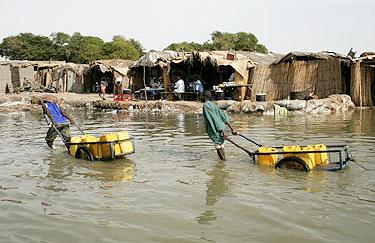 歡慶一年一度的「世界溼地日」,非洲第四大湖查德湖(Lake Chad),在2日當天成為完整的國際重要溼地,也彰顯出共享該湖泊的四個國家,實踐了他們10年前的共同承諾。
歡慶一年一度的「世界溼地日」,非洲第四大湖查德湖(Lake Chad),在2日當天成為完整的國際重要溼地,也彰顯出共享該湖泊的四個國家,實踐了他們10年前的共同承諾。
擁有部分查德湖的喀麥隆共和國2日宣布,根據拉姆薩溼地公約,該國擁有的查德湖領域成為國際重要溼地。同樣擁有該湖泊的查德和奈及利亞分別已在2001年和2008年作出此聲明。
拉姆薩公約秘書處表示,氣候變遷、上游灌溉用水需求和不當管理決策,使得查德湖在過去 40年來,規模減少了90%。
這片新的國際保護溼地──查德湖,是非洲薩赫勒乾旱區(Sahelian Africa)充滿生命的重鎮,對瀕危水獺、瞪羚、大象、河馬、尼羅河鱷魚和許多鳥類的生存皆非常重要。
查德湖是2000多萬人賴以漁獵和耕牧為生的家園,然而整個查德湖盆地受到氣候變遷、沙漠化、非永續的水資源管理和漁業威脅。這也突顯了2010年世界溼地日的主題:「溼地、生物多樣性和氣候變遷」。
拉姆薩公約秘書處秘書長帝野加(Anada Tiega) 2日表示,「今年的主題為『溼地』,生物多樣性和氣候變遷;口號是『關愛溼地:氣候變遷的解藥』。這兩者都反映了我們感到需要儘快解決全球變遷潛在災難的緊迫感,尤其是在12月的哥本哈根氣候會議之後。」
他還說到,「我們不僅想強調,溼地是解決全球變遷議題的必要元素,且氣候變遷議題必須以全面性、跨部門且以生態系為本的方式來看待。」
在南美,巴西政府已指定多賽河州立公園(Parque Estadual do Rio Doce)為該國第十處國際重要溼地。座落於巴西東南部的這片雨林湖泊生態系,是米納斯吉拉斯省(Minas Gerais) 瀕危的大西洋雨林區最大部分。
該溼地孕育了10個不同的植被群落、325種鳥類與至少77種哺乳動物。這裡可見到原生瀕危的巴西玫瑰木及其他瀕危物種,如美洲豹、角鵰,和南美洲最大的靈長類北方絨毛蛛猴。
外來種也是該溼地面臨的重大威脅之一,特別是入侵魚種導致了魚類社群的生態變化。不過,目前已有相應的經營管理計畫在進行中,整個查德湖受到完整的保護,更是聯合國教科文組織「大西洋森林生物圈保留區」的核心區域。
時至今日,全世界共有1886處溼地指定為國際重要溼地,總面積達1億8,515萬多公頃。
Today, World Wetlands Day is being celebrated with the full recognition of Africa's Lake Chad as a wetland of international importance, fulfilling a commitment made 10 years ago by the four nations that share the continent's fourth largest lake.
The declaration today by the Cameroon Republic that its portion of Africa's fourth largest lake is a wetland of international importance under the Ramsar Convention on Wetlands follows similar declarations by Niger and Chad in 2001 and Nigeria in 2008.
Climate change, the demand for irrigation water upstream, and poor management decisions have reduced the size of Lake Chad by 90 percent over the past 40 years, according to the Ramsar Secretariat.
Now the focal point of life in arid Sahelian Africa, the new internationally protected wetland is vital to endangered otters, gazelles and elephants as well as hippopotamuses, Nile crocodiles and many bird species.
Home to over 20 million people who depend on the lake for their fishing, hunting, farming and grazing, the entire Lake Chad basin is threatened by climate change, desertification and unsustainable management of water resources and fisheries, illustrating the theme of World Wetlands Day 2010 - Wetlands, Biodiversity and Climate Change.
Anada Tiega, secretary general of the Ramsar Secretariat said today, "This year's theme, Wetlands, Biodiversity and Climate Change, with the slogan "Caring for wetlands: an answer to climate change," captures the sense of urgency we all feel about the need to address the potentially disastrous consequences of global climate change as quickly as possible, particularly in the wake of the Copenhagen meeting of the UNFCCC back in December."
"We are trying to emphasize, not only that wetlands must be a key part of any progress in global climate change issues, but also that the problems of climate change must be a addressed in a holistic, multi-sectoral, ecosystem-based manner," said Tiega.
In South America, the government of Brazil has designated Rio Doce State Park (Parque Estadual do Rio Doce) as its 10th Wetland of International Importance. Located in the southeastern region of Brazil, the rainforest lake system is the largest fragment of the endangered Atlantic Rainforest in Minas Gerais state.
The site hosts 10 different vegetation communities, 325 species of birds, and at least 77 mammals. The endemic and threatened Brazilian rosewood, Dalbergia nigra, can be found here, as well as other threatened species, such as jaguar, Panthera onca, Harpy eagle, Harpia harpyja, and North Muriqui, Brachyteles hypoxanthus, the largest primate of South America.
One of the main threats is the introduction of exotic, invasive fish species that have led to changes in the fish community. Nevertheless, the site has a management plan that is being implemented. The site is a fully protected area and is one of the core areas of the UNESCO Atlantic Forest Biosphere Reserve.
Today, there are 1,886 wetlands designated as Wetlands of International Importance, a total area of 185,156,612 hectares (714 893 square miles).
全文及圖片詳見:ENS







